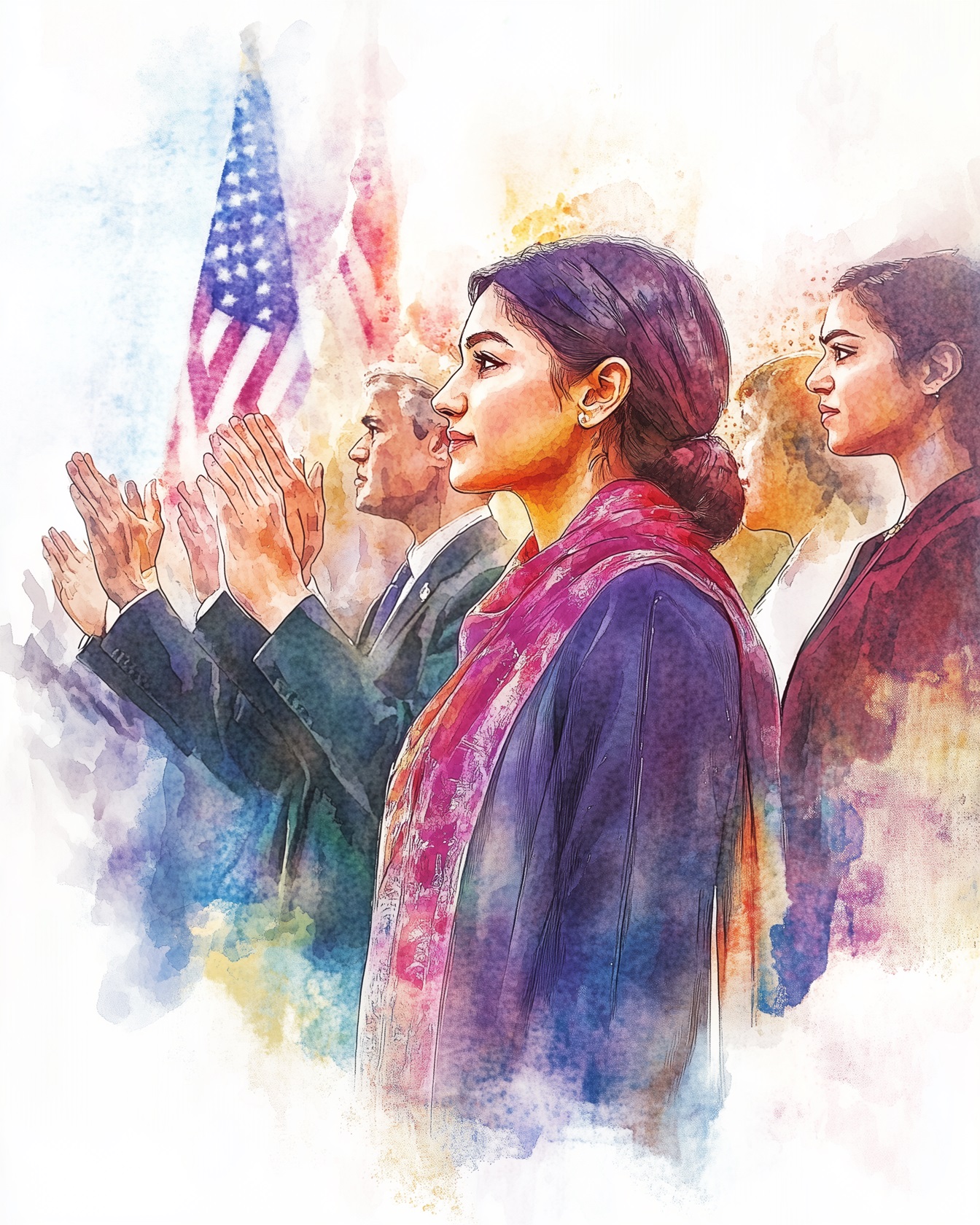Maya looked absent-mindedly around for her phone. The absence of the stream of thoughts droning in from her basin was almost like the absence of a heartbeat; there but only noticeable when it was gone.
The video was over. She scrolled down, looking at the titles, all related to Trump’s election victory from four days ago.
She looked away.
It was the same with the news. She had been reading, watching, listening to every report about the new administration they could get their hands on. But it was the same, endless loop of the same, endless news. And she couldn’t look away.
She looked at her reflection in the washroom mirror, and thought.
Her eyes were tired. There were dark rings underneath them.
Her mind felt the same.
She finished brushing her teeth and went through her morning skincare routine on autopilot, the motions soothing despite their meaninglessness.
As she dressed, she tried to resist the urge to turn on the news, to read more on her phone.
She gave in.
The news was the same as yesterday. She was not sure how many times she could read the same things, watch the same things, hear the same things.
But she knew that, like a car crash, she would read on, listen on, watch on. She would not be able to stop.
She opened her Calendar app and looked at her schedule. And then, like a moth drawn to a flame, she swiped to the next week, to the lone appointment on that Friday. Her citizenship interview.
Maya’s hands shook.
She forced herself to put her phone away and went to eat breakfast.
Today was an in-person day, so Maya went through her messages and emails and made sure that her desk was presentable before going to the kitchen to make herself a cup of coffee. She had around twenty minutes before her first appointment of the day.
The next few minutes went by in a blur. Work kept her mostly stable, as long as she didn’t have to deal with the aftermaths of the election directly, and her morning appointments were relatively calm.
Unfortunately, her first appointment, Priya, was the opposite of calm.
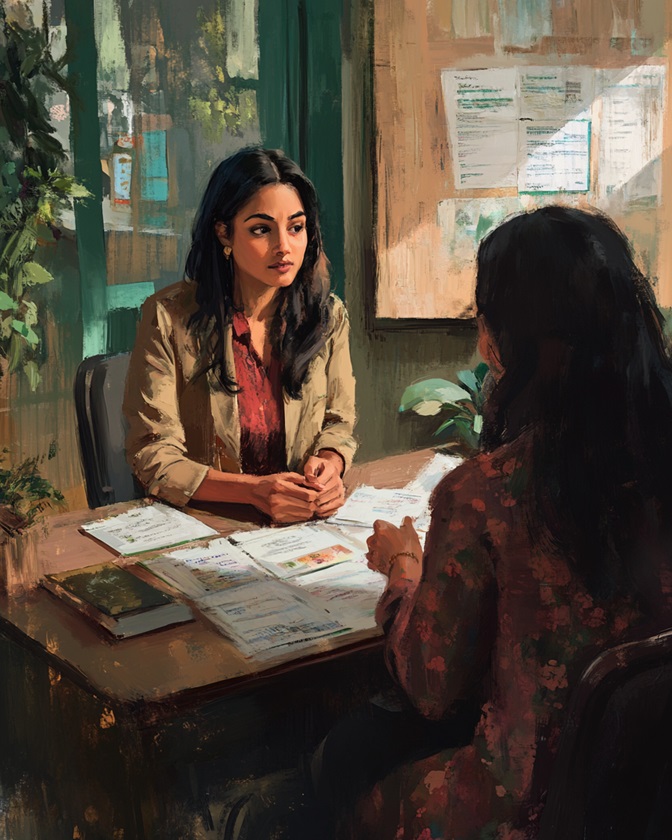
Priya was a 33-year-old Indian immigrant who had been in the US for almost two decades now. She had come here to go to medical school and had done a residency before deciding that she didn’t want to become a doctor. Her current job as a paralegal was a step down from her residency, but it was a much better fit for her. She had a husband, a young son, and a mortgage.
As Priya took her seat across Maya’s desk, Maya tried to keep her voice level and neutral. “What brings you here today, Priya?”
“I… I don’t know.” Priya’s hands were clenched together.
Maya leaned back and let the silence stretch on.
“I have a job. A family. I can’t complain.” Priya’s voice was flat.
“You’re here, so it must be something important.” Maya kept her voice gentle.
“It’s not important. Nothing is. There’s no point.”
Maya was silent.
Priya continued. “You’re right. There is no point. Nothing I do matters. What can I possibly do to stop him?”
“Who, Priya?”
“Him! Who else is it? Trump.” Priya’s voice was bitter, filled with resentment.
“He is our president. And what we can do, right now, is live our lives and work to make his term a normal one.”
“And then what?” Priya’s eyes blazed with anger. “He’ll be replaced with another one just like him.”
“Did something bring this on?”
“I don’t know. I just woke up yesterday and… it’s the same. The news is the same, the articles are the same, the protests are the same. Well…not the same. It’s getting worse. The neighborhood is getting restless. Someone threw a brick through our neighbor’s window last night.”
Maya nodded sympathetically.
“And what can I do? Nothing. Absolutely nothing.” Priya’s voice rose. “It’s not fair. It’s not right. What did I do to deserve this?”
“It’s not right. I’m sorry.” Maya’s voice was soft.
“I thought it would be different here. From India. That I’d get more choices. That I’d be able to do something.”
“You can. You have. You still are. What are you doing for yourself?”
Priya shook her head.
“Tell me.” Maya’s voice was soft.
“I don’t know. Working. Getting enough sleep.”
“Okay. That’s a start.”
Priya nodded.
She wanted to lash out too. But what good would it do?
“There’s a support group meeting on Tuesday. It’s for people who feel the same way you do.” Maya handed Priya a flyer. “Do you think it might help you to talk to people who are going through the same things as you?”
Priya nodded. “I’ll go. It can’t hurt.”
“That’s right. It can’t hurt. And, if you ever need to talk, please, don’t hesitate to call me.”
Priya’s smile was brittle. “Thank you.”
As Priya left, Maya could see the tension in her shoulders. The anger that she held close to herself.
Priya was a smart, well-adjusted, hard-working person who had managed to build a life for herself in the US, despite having faced obstacles at every turn.
If she was feeling hopeless and helpless, then things were truly bad.
Maya’s next appointment was with a woman named Saba.
Saba was 27 years old and had a three-year-old child. She came to the US a year and a half ago, after her marriage.
The moment Maya saw her, she knew that this was going to be a difficult meeting.
“Please, sit down.”
“Thank you.”
Saba sat down. She looked composed.
“How can I help you today, Saba?”
“I…” Saba swallowed. “I need to talk to someone. About my husband.”
“Okay. Do you want to tell me what’s going on?”
“I’m sorry, I shouldn’t have come.” Saba looked uncomfortable. “I don’t know why I’m even here.”
“I’m glad that you’re here.” Maya’s voice was gentle.
Saba nodded.
“Why did you decide to come today, Saba?”
“It’s so trivial, compared to the rest.”
“I doubt it.”
“It is.”
“Why don’t you let me be the judge of that?”
“He reported an undocumented worker at the deli he works at,” she said in a rush.
Maya waited.
“And he’s a brown man, like me. I think the deli owner’s going to fire him. I told him, it’s not right, what he did, but he doesn’t care.” Saba’s voice was bitter. “He was proud of it. Said that they shouldn’t have broken the law, that he did his job.”
“And you don’t agree.”
“How can I? I know what it’s like. What it’s like, to be an outsider in the US. To have no rights. No security.”
Maya nodded.
“But he won’t listen. He said that I was just a girl. That I don’t know anything. And that it wasn’t my job to tell him what to do. It was his job to take care of us, not the other way around.”
“And that upset you.”
“Of course it did! What did he expect? Did he think I’d be happy? That I’d celebrate his actions?”
Maya nodded. “What do you plan to do about it?”
“Nothing. I can’t do anything. It’s not worth the argument.”
“You don’t want to talk to him?”
“Why should I? He won’t listen.”
“Maybe he will.”
“I doubt it. He doesn’t listen to anyone.”
“Does he listen to you at all? About anything?”
Saba’s jaw tightened.

Maya waited.
“Never, except about stupid, superficial things.” Saba’s voice was quiet.
“Are you happy?”
“What does that matter? He’s my husband. I have to be there for him. He’s my responsibility. And besides, it’s not his fault.”
“Whose fault is it?”
“Mine. I wasn’t a good wife.”
“What makes a good wife?”
“To respect her husband. To support him, even if she disagrees. To help him.”
“And you don’t think that’s true for your husband as well?”
“What?”
“That he has the same obligations towards you.”
“No.” Saba shook her head. “Of course not.”
“Why not?”
“It’s different for men. He’s my husband. I’m his wife.”
“You have the same obligations, you just fulfill them in different ways. He is your responsibility, just as you are his. And that means that, at the end of the day, it’s the two of you against the world.”
“I suppose.”
“And what would happen if you tried talking to him?”
“I’d get nowhere. We’d end up fighting.”
“And if you didn’t?”
“He’ll still refuse.”
“Do you think he might change his mind if you tried again?”
“Maybe.” Saba’s voice was unsure. “I don’t know.”
“It’s worth a try, isn’t it? If you’re not happy with the way things are now.”
Saba was silent.
“Work for your marriage. Fight for it. And fight for yourself, too.”
“Thank you.” Saba’s voice was soft.
“If things get rough, please, give me a call. Don’t let it escalate. Please.”
“I’ll try.”
“Good.”
After Saba left, Maya closed her eyes and rested her head in her hands.
She was tired.
She felt useless.
What could she possibly say or do to help people?
The election had been a surprise. A slap in the face.
A reminder that no matter how hard she tried, no matter what she did, no matter how many people she helped, she would always be a foreigner, an outsider.
An immigrant.
She would never be American.
Maya went through the rest of her day on autopilot. By the time she left, it was already dark. Not because she had left late, but because winter was approaching, and the sunset now happened before 5 PM.
Along the way, she saw a commotion near a convenience store by Crescent Street and 30th Drive. She slowed her pace.
The crowd was gathered around a group of men, some of whom were sitting on the ground, handcuffed. There were police cars around, and an ambulance.
Maya’s blood ran cold.
What if her sister had been caught in the raid? What if her niece or nephew had been there?
She approached the nearest policeman.
“Excuse me, sir, do you know what happened?”
“There was an altercation. Don’t worry, ma’am. Everything is under control. Go home.”
“Did anyone get hurt?”
“They’ll be fine. Just some bruises.”
“What were they doing?”
“They were disturbing the peace. You don’t need to know more.”
“Okay. Thank you.”
As she turned to walk away, she spotted a Middle-Eastern older woman standing by the door of the store, arms crossed, looking upset.
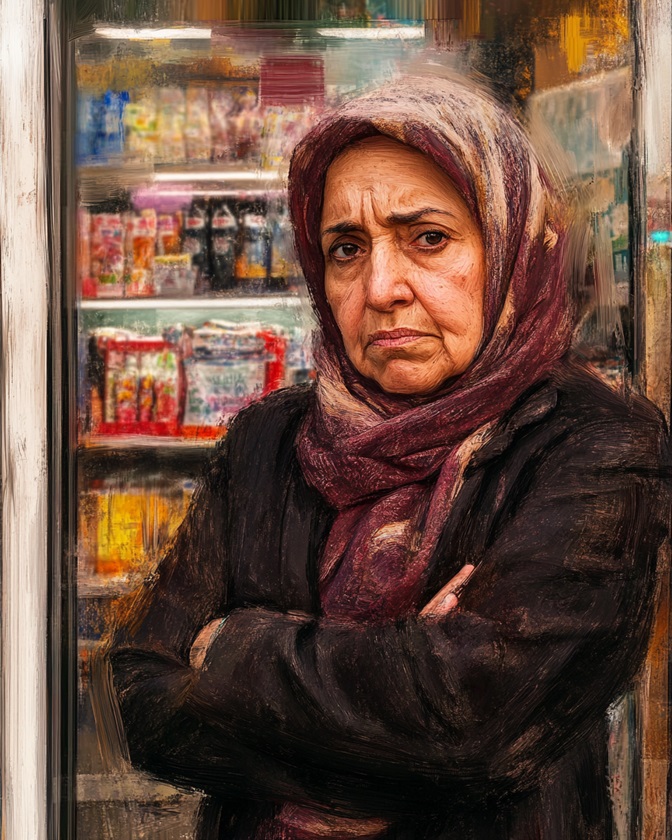
“Is everything alright, ma’am?” Maya asked.
“No, it is not.” The woman’s voice was sharp. “They came in here, yelling they knew I voted for Trump. Or Jill Stein. Because of the war. Because we hate America. They started breaking the shelves, the counter, anything they could reach. My son-in-law stopped them.”
“That’s terrible.” Maya’s voice was quiet.
“It is. This country is not safe for people like us anymore.”
“It is. It has to be.”
“We’ll see.” The woman’s voice was doubtful.
Maya was silent.
At home, she made dinner and ate in silence.
The news was not on, and Maya was grateful. She tried to watch the latest show on Netflix, but she could not focus on the plot, and so, after a few minutes, she gave up.
Instead, she pulled out a book and began to read.
By the time she finished her chapter, it was late, and she went to bed.
Sleep was elusive. She spent the first few hours staring at the ceiling, trying to keep her mind blank, but her thoughts kept drifting back to the events of the day.
Priya, Saba, the men at the convenience store, and the woman who owned the store.
She remembered how things had been in Bangladesh. How she had been a second-class citizen there because she was a woman.
She remembered all the times she had been casually groped on the bus.
The time her purse had been stolen when she had gotten off at the wrong stop.
The time she had been propositioned by a group of men while walking alone, and had been lucky enough to be able to slip away.
The time her parents had had their car window broken and the car key stolen while parked on the street.
The time she had been walking past an open construction site and had had her ass pinched, the man not even bothering to hide his leer.
The time she had walked in on a group of men in her class talking about her, about what they would like to do to her, how they would treat her, and she had left the room, her hands shaking.
She remembered all the times that, in high school and college, her clothes had been judged, her hair, her figure, her makeup.
How her family had been judged, and the things that had been said.
She thought she had left all that behind when she came to the US.
Apparently, she was wrong.
And she couldn’t help but wonder:
What if?
What if Trump’s immigration policies did get put in place?
What if she lost her citizenship?
What if she had to go back to Bangladesh?
What would her life be like then?
Would it be better? Would it be worse?
What would her life be like in Bangladesh, now that she had seen the possibilities offered by America, by the US?
She tried not to think about it.
~*~
The next day, when she got up, the sun was shining, and the air was cold.
She made breakfast, ate, and went to work.
Work was mostly the same, although she had a couple of appointments with community members that were more challenging than usual. Thankfully, it was a Friday, so the day was relatively short.
Around noon, she got a text from her cousin Reza, who lived in Bangladesh and worked for BRAC, a big non-profit. Once they had exchanged pleasantries, Reza asked her to join a virtual panel on women’s rights this coming Sunday.
“A panel discussion?” Maya asked. “Why would I want to do that?”
“You’re in America. You’re a woman. Your perspective will be invaluable. And it’s a great opportunity.”
“I’m not an activist, Reza.”
“I know. But you should consider it. It’ll be a good experience.”
Maya drew a deep, forlorn breath. “I don’t know if I have good stories to share.”
“Why wouldn’t you?”
“It’s different here.”
“What’s the harm? It can’t hurt to try. It’s a seven-woman panel, with panelists from all across the world. It’ll be interesting. And it’s free.”
Maya sighed.
“Come on, Maya. Do it for me. If not for yourself.”
“Okay, I’ll try. I can’t promise anything, though.”
“Thank you. I’m glad you agreed.”
After they hung up, Maya thought about her conversation with Reza.
A part of her was excited. A part of her was terrified.
This would be the first time she would speak about her experiences as a woman and an immigrant.
What if she didn’t have any good stories?
What if her experience wasn’t bad enough, wasn’t interesting enough, wasn’t important enough?
What if she wasn’t good enough?
~*~
Brunch with Nadia and Zara was usually fun.
They had gone to college together, and the three of them had become close friends, despite their very different personalities.
All of them had immigrated from Bangladesh: Nadia had come here when she was six, while Zara had come here when she was nineteen. Nadia that perfectly naturalized American accent, while Zara and Maya still bore vocal markers of their upbringing in Bangladesh.
Nadia was tall and lean, with light skin and brown dyed hair. Zara, on the other hand, was petite and curvy, with dark skin and black hair.
When Nadia had suggested brunch at the Blue Diner, Zara had insisted that they go to the diner’s sister location instead.
The Blue Plate Special, located in Astoria, had a very similar menu, with the exception of its blueberry pancakes, which Maya ordered.
Nadia had the French toast, while Zara had the scrambled eggs.
As they ate, the conversation drifted between topics.
Zara’s new boyfriend, whom Maya had yet to meet.
Zara’s job search.
Nadia’s new house, and the renovations she had recently done.
Nadia’s new job, and the projects she was working on.
And then, inevitably, the conversation shifted to the election.
“So, Trump. I didn’t see that coming.” Nadia took a bite of her French toast.
“Yeah, who did?” Zara shook her head.
“Well, a lot of people.” Nadia paused. “A lot of people did. More than I expected.”
“Yeah,” Zara said. “Can’t believe people voted him in twice. I thought it would only happen once.”
“People can be idiots.” Nadia took a sip of her water.
Maya’s mouth tightened. “It’s not right.”
“I know,” Nadia said.
“Yeah, it sucks,” Zara added.
“You didn’t expect this, did you?” Nadia looked at Maya.
“No.” Maya shook her head. “No.”
“You okay?”
“I don’t know. No.”
Nadia was silent.
“It’s… It’s just hard. I mean, my citizenship interview is coming up, and what if I lose it?” Maya’s voice cracked.
“Don’t talk like that.” Nadia reached out and grabbed her hand. “You’re gonna get through this.”
“Yeah,” Zara added. “It’ll all work out.”
“How can you say that?” Maya asked.
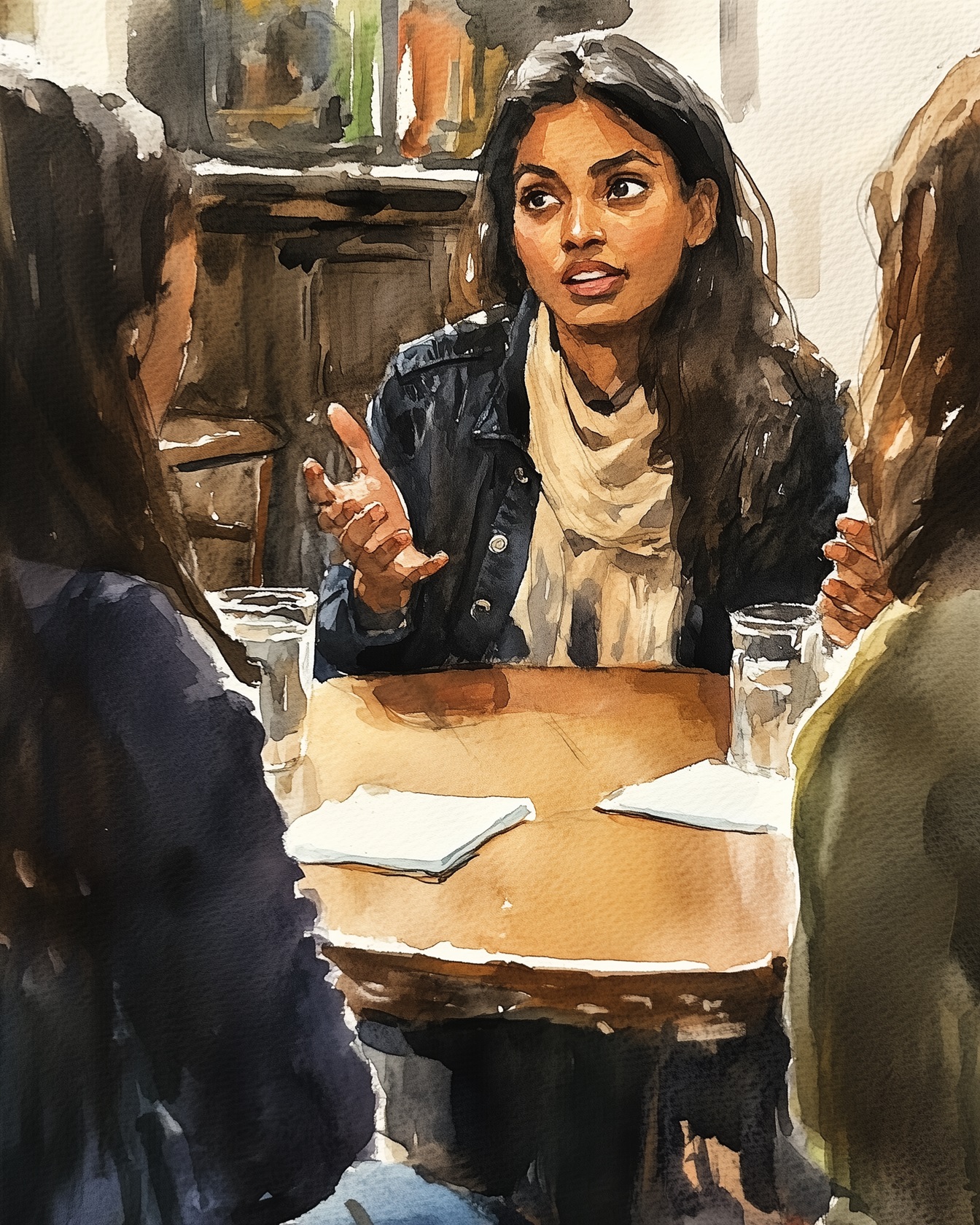
“Because I know you. You’re strong. You’ll get through this.” Nadia’s voice was gentle.
“Yeah,” Zara added. “Besides, nothing will change. It’ll be okay.”
Maya was silent.
She wasn’t sure if she could believe them.
“To be honest, even if I do well with the interview, I am not sure I want to be a US citizen anymore. Things are changing.”
“Not really.” Nadia’s voice was firm.
“You didn’t see the things I saw yesterday. I was walking back home from work, and there was this commotion near a convenience store. There was a group of men being taken into police custody, and there were a lot of people standing around, watching.”
“They attacked the store because the owner was Arab American, and they thought she voted for Trump.” Maya’s voice was flat.
“Oh, shit,” Nadia said. “Really?”
“Yeah.” Maya was silent for a moment. “It’s scary.”
“Yeah,” Zara said.
“Sometimes I wonder how things would have been if I never left Bangladesh. Maybe it would have been better. Maybe I wouldn’t have felt so out of place here.”
“That’s stupid.” Nadia’s voice was sharp.
“You don’t know that,” Maya protested.
“Yeah, I do. Did you see what the Tablighi conference goers do at Dhaka University campus? They invaded women’s washrooms and forced them to wear ornas. Then there’s that dismembered body they found with no clothes. And the rape statistics. Did you see them?”
Maya was silent.
“Don’t let a bunch of assholes convince you that life is easier there. It’s not. Trust me.”
“How do you know?”
“Did you forget the first time you came home at 1 AM and didn’t have to worry about getting raped and left in a ditch? Or how the police doesn’t harass you and your friends every time you go out to a bar? Or the fact that you don’t have to worry about being fired from your job because you refused to sleep with your boss?”
Maya’s voice was quiet. “No.”
“Yeah. I didn’t think so.” Nadia’s voice was sharp.
“You don’t have to be so harsh, Nadia,” Zara said. “It’s different for you. You grew up here. You have a whole circle of support. We don’t.”
“Yeah.” Nadia’s voice was quiet.
“Sometimes, I don’t know what I’m doing here, really,” Zara said. “I’ve never felt as alone as I did the first time I moved to America. It was… difficult.”
“I’m sorry.” Nadia’s voice was gentle.
“Yeah. I had to learn everything. And I mean everything. How to live. How to work. How to cook. How to be independent. How to stand up for myself. I had no one. No family, no friends, no nothing.”
“But you did it, right?” Nadia asked, reaching out and squeezing Zara’s hand.
“Yeah.” Zara’s voice was quiet. “I did.”
“I know it’s not easy, but please, don’t give up.” Nadia’s voice was soft.
“Okay.” Zara’s voice was faint.
Maya tried to join in, but she couldn’t. Things weren’t so clear cut for her.
She was caught between the two extremes.
On one hand, there were the people who were against immigrants and foreigners, and on the other, the people who thought that America was the answer to all their problems.
She wasn’t sure what to think anymore.
~*~
That Sunday, Maya did her best to pep herself up before the panel discussion. She spent almost two hours on a morning run, she watched her favorite movie, and she made a large batch of chocolate chip cookies.
She spent an hour or so choosing her outfit, settling on a green-and-blue printed skirt and a cream-colored sweater. She brushed her teeth, and styled her hair into a bun, leaving a few tendrils loose.
She applied a bit of foundation, mascara, and lipstick, and then stepped back and examined her reflection in the mirror.
She looked good. Professional.
The conference was online, and she had a link to the Zoom meeting room.
She double-checked the time, and then, after taking a deep breath, she entered the meeting room.
Reza was already there, and he gave her a thumbs-up.
There were six other women on the panel: a Bangladeshi woman,an Afghanistani woman, a South Korean woman, a white British woman, an Indonesian woman, and a Brazilian woman.
All of them were wearing business-casual clothing.
They introduced themselves, and then started going around and talking about their experiences as women and immigrants.
Maya was surprised.
They were all so strong. So sure of themselves.
The Indonesian panelist, Dewi, had a quiet strength about her that commanded attention.

“In Indonesia,” Dewi began, her voice soft but firm, “we face many challenges as women. One of the most pressing issues is child marriage. I grew up in a small village in Central Java, and I saw firsthand how girls as young as 14 or 15 were married off to men twice their age.”
Dewi paused, her eyes distant with memory. “I remember my childhood friend, Siti. She was only 15 when her parents arranged her marriage to a 35-year-old man from a neighboring village. Siti had dreams of becoming a teacher, but those dreams were shattered the day she was forced to leave school and move in with her new husband.”
The other panelists listened intently as Dewi continued. “Child brides like Siti are stripped of their agency. They have no say in who they marry or when. Their education is cut short, and they’re thrust into adult responsibilities before they’re ready. It’s a cycle that’s hard to break.”
Dewi’s voice grew more passionate as she delved deeper into the issue. “And it’s not just child marriage. Even adult women often have little say in their marriage decisions. Arranged marriages are still common, especially in rural areas.
Women are expected to be obedient wives and mothers, with little regard for their own desires or ambitions.”
She shared another personal anecdote: “My cousin Rina was 22 when her parents arranged her marriage to a man she’d never met. She had just graduated university and wanted to pursue a career in finance. But her parents insisted that it was time for her to settle down. Rina cried for days, but in the end, she felt she had no choice but to agree.”
Dewi’s expression grew somber as she moved on to another topic. “Perhaps even more alarming is Indonesia’s high maternal mortality ratio. We lose far too many mothers during childbirth or due to pregnancy-related complications. In 2017, our maternal mortality ratio was 177 deaths per 100,000 live births. That’s one of the highest in Southeast Asia.”
She leaned forward, her eyes intense. “And do you know why? Because no one cares about the mother’s choices. Women often lack access to quality prenatal care. They’re not given enough information to make informed decisions about their pregnancies and births. In many cases, their husbands or families make decisions for them.”
The Afghanistani panelist, Fatima, nodded solemnly as Dewi finished speaking. She took a deep breath before beginning her own account.
“The situation for women in Afghanistan is dire,” Fatima said, her voice steady but tinged with sadness. “Under Taliban rule, we have been stripped of our most basic rights and freedoms. The repression is severe and all-encompassing.”
She paused, gathering her thoughts. “Let me tell you about my friend Zainab. She was a university professor before the Taliban took control. Now, she sits at home, unable to work or even leave the house without a male guardian. Her mind, once filled with lectures and research, now wrestles with depression and hopelessness.”
Fatima’s eyes grew distant as she continued. “Education for girls and women has been all but eliminated. Schools for girls beyond sixth grade have been closed.
I remember the day the Taliban announced this decision. I was visiting my niece Amira, who was in eighth grade at the time. She broke down in tears, asking why she couldn’t learn anymore. How could I explain to a 13-year-old that her dreams were being crushed because of her gender?”
The other panelists listened intently as Fatima described the current situation. “But Afghan women are resilient. Secret schools have sprung up in homes and basements across the country. My sister runs one such school, teaching a group of teenage girls in her living room. Every day, she risks severe punishment to ensure these girls don’t lose hope.”
Fatima’s voice grew stronger as she spoke of resistance. “We find ways to make our voices heard, even when silenced. Social media has become a lifeline for many Afghan women. We use VPNs and encrypted messaging apps to share our stories, to organize, to remind the world we exist. My friend Soraya runs an anonymous Instagram account documenting Taliban abuses. She’s received death threats, but she refuses to stop.”
Her expression darkened as she moved on to another topic. “The mental health crisis among Afghan women is heartbreaking. Rates of depression and anxiety have skyrocketed. Suicide attempts are increasing. I volunteer with a secret women’s support group, and the stories I hear are devastating. Women who feel trapped, who see no future for themselves or their daughters.”
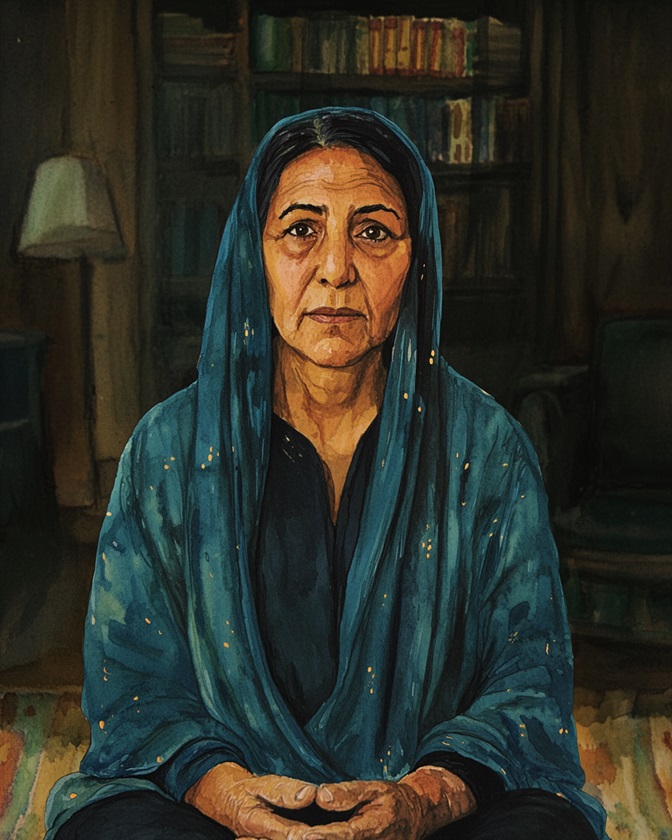
Fatima leaned forward, her eyes intense. “And yet, despite everything, Afghan women continue to resist. Last month, a group of women in Kabul staged a rare public protest against the hijab mandate. They knew the risks – beatings, imprisonment, or worse – but they stood firm. The Taliban violently dispersed the protest, but not before the women’s courage inspired many across the country.”
She sighed heavily. “International support has waned as the world’s attention moves elsewhere. But we cannot be forgotten. Every small act of defiance, every girl taught in a secret school, every woman who speaks out online – these are victories in our ongoing struggle for basic human rights.”
Maya listened intently as Fatima finished speaking, her heart heavy with the weight of the Afghan women’s struggles. She felt a mix of emotions – sadness at their plight, admiration for their resilience, and a creeping sense of guilt about her own relatively privileged position.
Two more panelists took their turns. Ji-Soo, the South Korean panelist, spoke next with determination. She addressed the challenges her country faces: though modern on the surface, deeply ingrained patriarchal values still shape society. Women are expected to conform to beauty standards and face inequality in the workplace, earning only 63% of what men do. However, she also shared hope for change through movements such as #MeToo.
Amani from Kenya spoke next. She passionately described the challenges of gender equity in her country, citing cultural norms and traditional gender roles as major obstacles. Growing up in a small village, she witnessed the inequality firsthand – boys were encouraged to go to school while girls were expected to help with household chores and get married early. Access to education is still a major issue, with families prioritizing boys’ education and pulling girls out of school for marriage or domestic duties. Amani shared a personal story about a friend who was forced into marriage at 14, crushing her dreams of becoming a doctor. She emphasized the deeply ingrained traditional gender roles that expect women to be submissive wives and mothers, while men are seen as breadwinners and decision-makers.
When it was Maya’s turn to speak, she hesitated for a moment. Her experiences as an immigrant woman in America suddenly felt trivial compared to the harrowing accounts she had just heard. But she reminded herself that every voice mattered, every story was valid.
“Thank you all for sharing your powerful stories,” Maya began, her voice slightly shaky. “I immigrated to the United States from Bangladesh about five years ago. While my experience has been different, I’ve faced my own set of challenges.”
She paused, gathering her thoughts. “In many ways, coming to America was liberating. I could pursue my career without facing the constant harassment and limitations I experienced in Bangladesh. But it also meant starting over completely – leaving behind my family, my culture, everything familiar.”
Maya’s voice grew stronger as she continued. “The isolation was overwhelming at first. I remember my first week in my tiny studio apartment, crying myself to sleep every night. I didn’t know anyone, didn’t understand so many cultural nuances. Even simple tasks like grocery shopping or using public transportation felt daunting.”
She shared an anecdote from her early days. “I once spent an entire afternoon wandering around a supermarket, too embarrassed to ask for help finding the simplest items. I left with a bag full of random groceries I didn’t even need, just to save face.”
The other panelists nodded in understanding as Maya went on. “And then there’s the constant pressure to prove yourself. As an immigrant woman of color, I often feel I have to work twice as hard to be taken seriously in my field. There’s this underlying anxiety that any mistake will be attributed not just to me, but to my entire gender or ethnic background.”
Maya’s expression grew more serious. “The recent political climate has added another layer of stress. The rise in anti-immigrant sentiment, the tightening of immigration policies – it’s all created a sense of uncertainty and fear in our communities.”
She shared a recent experience. “Just last week, there was an incident near my neighborhood. A group of men vandalized a convenience store owned by an Arab American woman, accusing her of supporting Trump or being anti-American. It shook me deeply, reminding me how fragile our sense of belonging can be.”
“To tell the truth, I am not sure if I want to be a US citizen anymore.” Maya’s voice was quiet. “Things are changing. And not necessarily for the better.”
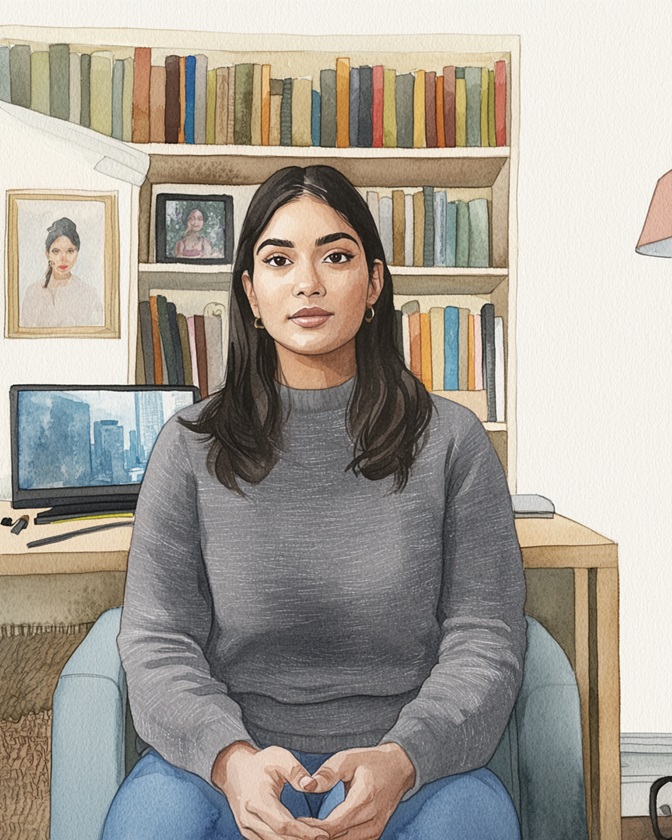
Fatima, the Afghanistani panelist, raised her hand, her expression concerned. “But why would you want to give up on the American Dream?”
“It’s not the American Dream I am giving up on. It’s the idea of America.” Maya’s voice was soft. “This country is not a meritocracy. It is a land of opportunity, yes, but it’s also a place where some people are treated better than others.”
“But don’t you think it’s worth fighting for? For equality, for justice?” Fatima asked.
“I don’t know.” Maya was silent.
The other panelists were quiet.
“I used to think that this country was the answer to all my problems, the solution to everything.” Maya’s voice was faint. “But now, I am not so sure. This country is not perfect. In fact, it’s far from it.”
“That’s true.” Ji-Soo, the South Korean panelist, chimed in.
“Yeah,” Amani, the Kenyan panelist, agreed.
“But that doesn’t mean we shouldn’t keep fighting,” Fatima, the Afghanistani panelist, persisted. “Even if things are difficult right now, it doesn’t mean we should give up.”
“What’s the point?” Maya asked.
“Because that is your country, as much as it is Trump’s,” Fatima said. “You have a right to be here, and to fight for what you believe in.”
Maya felt a lump form in her throat at Fatima’s words. She hadn’t expected such fierce support from a woman who had endured so much herself.
“You’re right,” Maya said softly. “It’s just… sometimes it feels like an uphill battle. Like no matter how hard we try, things don’t change.”
“Change takes time,” Dewi, the Indonesian panelist, chimed in. “But it does happen. Look at my country – we still have a long way to go, but we’ve made progress. Women are entering politics, challenging old norms. It’s slow, but it’s happening.”
Maya nodded, feeling a spark of hope ignite within her. “You’re all so brave,” she said. “Facing such immense challenges and still fighting. I admire that strength.”
“We all have that strength,” Ji-Soo said. “Sometimes we just need to be reminded of it.”
As the panel continued, Maya found herself opening up more. She shared stories of microaggressions she’d faced at work, of the constant pressure to “assimilate” while also being told she’d never truly belong. But she also spoke of the kindness she’d encountered, the diverse community she’d found, the opportunities she’d been given.
By the end of the discussion, Maya felt a renewed sense of purpose. The struggles she faced were real, but so was her resilience. And she wasn’t alone.
After the panel ended, Maya sat back in her chair, mind whirling with everything she’d heard and shared. She picked up her phone and opened her calendar app, scrolling to that Friday appointment – her citizenship interview.
For the first time in days, she didn’t feel dread when she looked at it. Instead, she felt a quiet resolve. This was her home now, imperfect as it was. And she had a role to play in shaping its future.
She closed her eyes, allowing the memories of her journey to America to wash over her. The nervousness of her first day at work, stumbling over unfamiliar idioms and customs. The pride she felt when she received her first promotion, knowing she had earned it through her own merit. The warmth of friendships forged with people from all walks of life, bonded by their shared experiences as immigrants.
But with these positive memories came the darker ones too. The casual racism she’d encountered, the subtle ways she’d been made to feel like an outsider. The gnawing fear that had taken root since the election, the uncertainty about her place in this country she’d come to call home.
Maya opened her eyes, her gaze drifting to the window. Outside, the late afternoon sun painted the sky in hues of orange and pink. A group of children rode by on bicycles, their laughter carried on the breeze. In the distance, she could see the silhouette of the city skyline, a testament to the dreams and ambitions of countless immigrants who had come before her.
She thought about Fatima’s words, about how this country belonged to her as much as anyone else. She thought about Dewi’s reminder that change, though slow, was possible. She thought about her own experiences, both good and bad, that had shaped her time in America.

“This is my home now,” Maya whispered to herself. “It’s not perfect, far from it. But it’s a place where I can make a difference. Where my voice can be heard.”
She realized that by claiming her American identity, she wasn’t erasing her Bangladeshi roots. Instead, she was adding another layer to her complex identity. She could be both – proudly Bangladeshi and proudly American. And in doing so, she could help shape what it meant to be American.
“I can’t change things if I run away,” she mused. “And I want to change things. I want to make this country live up to its ideals – for myself, for other immigrants, for everyone who calls this place home.”
Maya took a deep breath and began making notes. There was work to be done, and she was ready to do it.
~*~
One Week Later
Maya waited in the government office, trying to hide her trembling hands. The room was bland and bare, with only an American flag and a portrait of the president on the wall. The fluorescent lights hummed above, highlighting every flaw.
The interviewer sat across from her, a stern woman with gray hair pulled back tightly. Dressed in a navy blue blazer, she looked official and unfeeling as she flipped through Maya’s file.
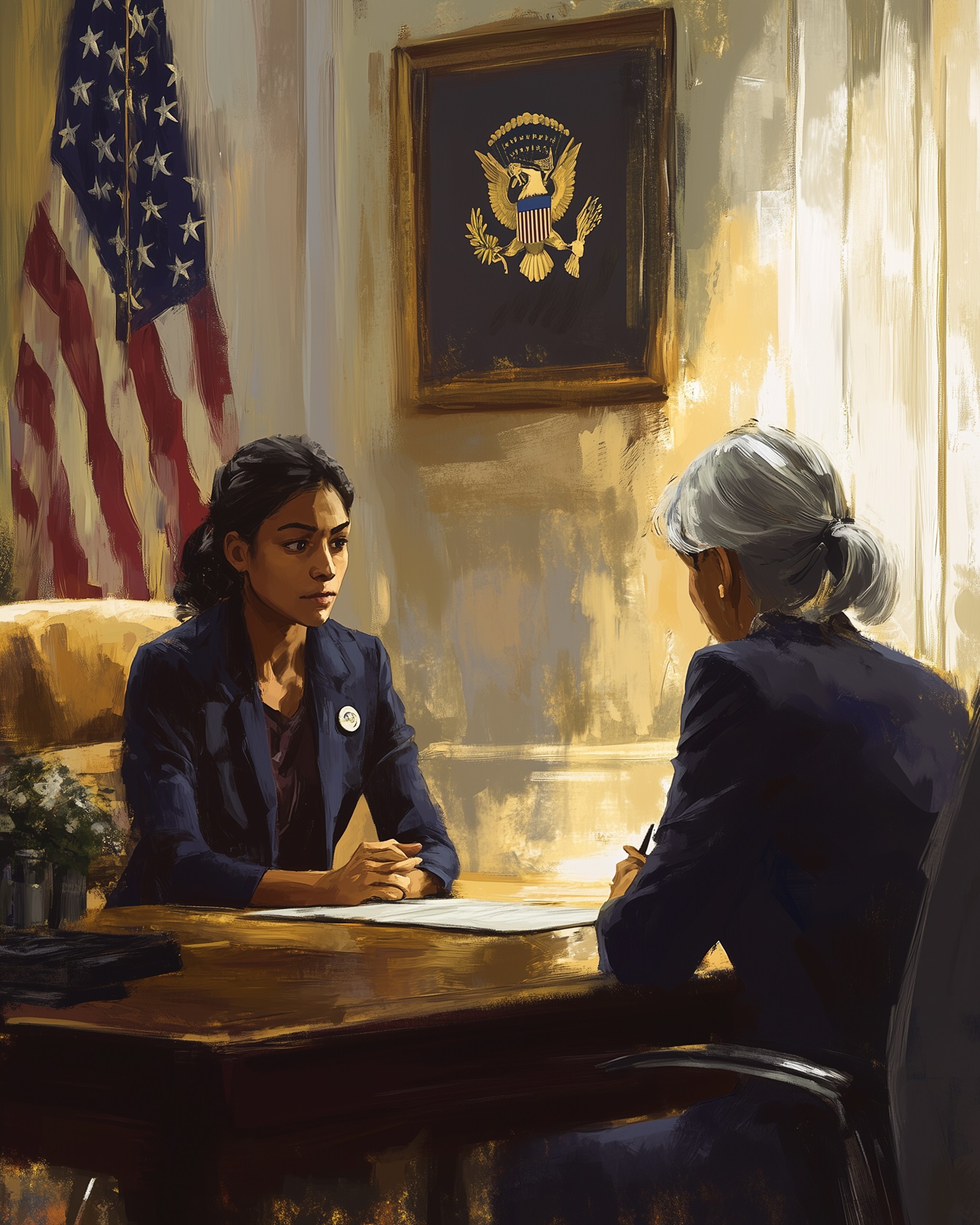
Despite her nerves, Maya felt determined. The past week had been a rollercoaster of emotions, but now she had clarity and purpose.
“Ms. Rahman,” the interviewer began, her voice neutral, “why do you want to become a United States citizen?”
Maya’s breath caught as she remembered the panel discussion, and Fatima’s encouraging words. Her heart pounded in her chest, her palms slick with sweat as she sat in the sterile interrogation room. The question hung in the air, a specter of doubt and uncertainty. Why did she want citizenship?
Her mind raced, thoughts swirling like leaves in a tempest. She knew her reasons, but how could she articulate them convincingly? Her desire for freedom, for opportunity, for a fresh start – these were not easily quantifiable things.
She swallowed hard, feeling the dryness in her throat intensify. The pressure was immense; it felt like standing on the edge of a precipice with nothing but darkness below. But Maya had never been one to back down from challenges.
She drew upon an inner reservoir of strength, reminding herself of all that she had overcome to be here. The hardships she’d endured, the sacrifices made… they were testament to her resilience. Yes, she was nervous – who wouldn’t be under such circumstances? – but she was also determined.
The questioning gaze of the immigration officer seemed less intimidating now. She straightened up in her chair and met his eyes squarely.
“I want to become a U.S. citizen,” Maya began, her voice steady despite her racing heart, “because I believe in the potential of this country. It’s not perfect – no place is. But it’s a country where change is possible, where voices can be heard.”
She paused, gathering her thoughts. “I’ve learned that being an American isn’t about where you were born, but about the ideals you choose to uphold. It’s about fighting for justice, even when it’s difficult. It’s about embracing diversity and working to create a society where everyone has a chance to thrive.”
Maya’s voice grew stronger as she continued. “I want to be a citizen so I can fully participate in shaping this country’s future. So I can vote, serve on juries, run for office if I choose. I want to contribute my voice and my experiences to the ongoing American story.”
“Most of all, I want to be a citizen because, despite its flaws, this country has become my home. And I believe that by fully embracing my place here, I can help make it better – not just for myself, but for all those who come after me.”
As Maya finished speaking, she saw something shift in the interviewer’s expression – a softening around the eyes, the faintest hint of a smile.
The interviewer nodded, her stern demeanor softening slightly. “That’s a thoughtful answer, Ms. Rahman. Now, let’s continue with the civics portion of the interview.”
For the next thirty minutes, Maya answered questions about American history and government. She named the branches of government, recited the first words of the Constitution, and explained the significance of the Declaration of Independence. With each correct answer, her confidence grew.
“Very good,” the interviewer said, making notes on her clipboard. “Now, I’d like you to read this sentence aloud.” She slid a piece of paper across the desk.
Maya read clearly: “The Constitution gives many rights to American citizens.”
“Excellent. Now, please write this sentence as I dictate it,” the interviewer instructed.
Maya picked up the pen, her hand steady now. She wrote carefully as the interviewer spoke: “Freedom of speech is a right of all Americans.”
The interviewer reviewed Maya’s writing and nodded approvingly. “Well done, Ms. Rahman. Now, I have a few more questions about your application and background.”
They discussed Maya’s work history, her reasons for coming to the United States, and her ties to the community. Maya spoke passionately about her job counseling other immigrants, her volunteer work at the local literacy center, and her involvement in her neighborhood association.
As the interview drew to a close, the interviewer set down her pen and looked at Maya with a hint of a smile. “Ms. Rahman, I’m pleased to inform you that you have passed the naturalization interview. Barring any unforeseen issues, you should receive an invitation to your oath ceremony within the next few weeks.”
Maya’s heart soared. “Thank you,” she said, her voice thick with emotion. “Thank you so much.”
The interviewer stood and extended her hand. “Congratulations, Ms. Rahman. I look forward to calling you a fellow American citizen soon.”
As Maya left the office, she felt as if she were floating. The hallway seemed brighter, the air fresher. She stepped out into the crisp autumn afternoon, leaves crunching under her feet.
She pulled out her phone and dialed Nadia’s number with shaking fingers.
“I passed,” she said as soon as Nadia picked up. “I did it.”
Nadia’s joyful shriek made Maya hold the phone away from her ear, laughing. “I knew you would! Oh, Maya, I’m so proud of you!”
As Maya walked home, she felt a profound sense of belonging wash over her. This country, with all its flaws and contradictions, was hers now. And she would fight to make it a place where everyone could thrive, no matter their background.
She was an American now, and nothing could take that away from her.
~*~
